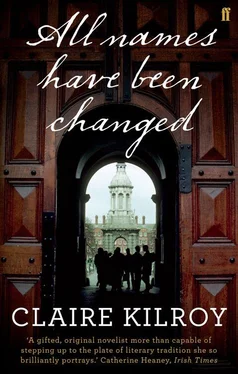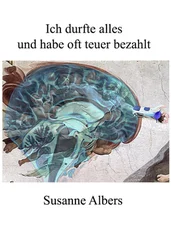Claire Kilroy - All Names Have Been Changed
Здесь есть возможность читать онлайн «Claire Kilroy - All Names Have Been Changed» весь текст электронной книги совершенно бесплатно (целиком полную версию без сокращений). В некоторых случаях можно слушать аудио, скачать через торрент в формате fb2 и присутствует краткое содержание. Год выпуска: 2010, Издательство: Faber & Faber, Жанр: Современная проза, на английском языке. Описание произведения, (предисловие) а так же отзывы посетителей доступны на портале библиотеки ЛибКат.
- Название:All Names Have Been Changed
- Автор:
- Издательство:Faber & Faber
- Жанр:
- Год:2010
- ISBN:нет данных
- Рейтинг книги:5 / 5. Голосов: 1
-
Избранное:Добавить в избранное
- Отзывы:
-
Ваша оценка:
- 100
- 1
- 2
- 3
- 4
- 5
All Names Have Been Changed: краткое содержание, описание и аннотация
Предлагаем к чтению аннотацию, описание, краткое содержание или предисловие (зависит от того, что написал сам автор книги «All Names Have Been Changed»). Если вы не нашли необходимую информацию о книге — напишите в комментариях, мы постараемся отыскать её.
All Names Have Been Changed — читать онлайн бесплатно полную книгу (весь текст) целиком
Ниже представлен текст книги, разбитый по страницам. Система сохранения места последней прочитанной страницы, позволяет с удобством читать онлайн бесплатно книгу «All Names Have Been Changed», без необходимости каждый раз заново искать на чём Вы остановились. Поставьте закладку, и сможете в любой момент перейти на страницу, на которой закончили чтение.
Интервал:
Закладка:
At six minutes to noon by the faulty clock, the group entered the building. Aisling, Faye, Guinevere, and Antonia. They were cutting it fine. The other three students had already turned up by then; one girl sat by the radiator under the window, the other next to the door. The guy with the ponytail and army fatigues had established a little dugout in the corner. We’d been sitting in silence for maybe five minutes when the door on ground level was thrown open. The sound of female laughter came drifting up the stairs, ascending the building as steadily as fire. Not Glynn then. My disappointment didn’t last long. The group crowded through the door in boisterous pairs, talking, the whole time talking, all at once so as to confuse me. Four women. Two of them girls.
The presence of four silent strangers in the workshop ahead of them did not disrupt the flow of their conversation. The impact of Beckett’s Protestantism and Joyce’s Catholicism upon their respective writing styles was the discussion heading. Their cohesion, their bantering familiarity, was such that I assumed they’d known each other from before. What a surprise it was to learn some weeks later that they’d met on the way in the door. They gave such an impression of an organic whole that perhaps I never saw one without the spectrum of the other three. Even Guinevere. It proved a tricky process extracting her from their chrysalis, to the extent that in our private moments I sometimes sensed them listening in, waiting for me to put a foot wrong, poised to dive in and snatch her back.
A hush fell as the hands of the schoolhouse clock approached noon. All of us by then were seated. You would think Glynn was scheduled to appear with a puff of smoke when the big and little hands connected, never mind that the clock was slow.
‘Jesus, I hate this kind of weather,’ one of them murmured, the eldest. West Brit accent. Hard to miss it. ‘For heaven’s sake, just look at it.’
We turned our heads to the window, synchronised swimmers. A soft rain was falling on the shining slate rooftops. It was almost, but not quite, mist. An avenging angel in the distance brandished a sword before a verdigris dome. There was something immensely restful about this scene. The lack of living souls in it, probably.
‘I knew it,’ said the same woman when noon by the slow clock had come and gone. Antonia. Her standards were unattainably high. ‘Glynn’s not coming. I knew he wouldn’t come. I just bloody knew it.’
The air seemed to go out of the room at this declaration. We had managed to fool ourselves until then, but Antonia was right. The chances of Glynn fulfilling a contractual obligation with an academic institution were laughable at best. His errant behaviour had been fussily documented over the years. He had made a name for himself by defaulting on contracts, ignoring writs, laughing off threats and generally bowling along with apparent impunity, capitalising on the extenuating circumstances allegedly occasioned by the artistic personality. There was nothing to be gained from suing a man with a print run of just a few thousand. Antonia dropped her head into her hands.
‘I cannot believe I’ve been so effing stupid,’ she said, ‘coughing up good money for this.’ Her words were met with rueful assent.
There was a discussion then, at least there must’ve been, though my recollection is that the four, my four, simply stood up and left. They filed out in pairs as before, and the workshop resumed its silence. I stood up and crossed over to the window to observe their exit. They reappeared below on Front Square and headed off in the direction of the Buttery, forming geometrical shapes as they moved along the cobbles — a parallelogram, a trapezoid, a diamond.
A lone seagull wheeled in a circle above the Examination Hall, its cries as distant as a star. I watched until the group had disappeared from sight, and then I watched the empty space that had opened in their wake, obscurely disappointed that they hadn’t taken me with them. But why would they? They did not know me from Adam. Behind me, after a respectable period of time had elapsed, the other three students stole back down the stairs as discreetly as they were able, as if slipping away early from a funeral.
*
Glynn stood us up again the second week. Antonia maintained her position that she knew it, just bloody knew it, always had known it, that Glynn wasn’t going to show up at all, ever, that we’d flushed our money down the jacks and landed ourselves with a pig in a poke. I didn’t question how she could be so adamant, how it was possible to know in advance what Glynn — a capricious man at the best of times — would and would not do. It seemed natural that those around me should know more about Glynn than I knew. Everybody in Trinity was an authority on him.
‘We should report him,’ Antonia said. ‘We should go this minute to the Dean of Studies, all of us.’ She picked up her handbag.
‘But we can’t do that!’ the one with the auburn hair protested. Faye. ‘We’ll get Professor Glynn into trouble.’
‘Yeah,’ the one with the black hair and white face agreed. ‘Then we’ll never see him.’ Antonia hadn’t thought of that. He’d outwitted her already. She reluctantly returned her handbag to the floor.
In the terrible absence of Glynn, I took to the library. Days on end I spent in the English section that October, arriving at opening time, staying put until the lights flashed last orders. On Saturday mornings, while normal students slept, I was in there on the off chance that the muse might creep up when no one was looking, as if inspiration were not a mental process but a ghost. If I could’ve slipped into that library in the dead of night, I would have, those early weeks, searching for a portal through which to access the metaphysical world of letters. I felt it as a constant alongside me, that world; fecund, poetical, but out of reach.
*
Week three. Glynn stood us up a third time. The group turned and left the workshop almost as soon as they’d arrived; a flock of swallows switching direction mid-flight.
The humanities library was located in the basement of the Arts Block. It had bare cement walls and orange carpet tiles. Figures wandered through the forest of bookcases; visible, occluded, visible, occluded. I saw Guinevere there from time to time, twirling a corkscrew curl around her finger as she read. Sometimes her lips pouted to form a particularly intriguing word, I couldn’t help but notice. She had doubtlessly entered that serene state which so deftly eluded me. I didn’t dare approach her. I didn’t dare interrupt. At night, after they’d herded us out of the library to lock up, I crossed back over to the other side of the city, having failed once again to break through to that yearned-for condition, the contemplation of which had sustained me through those long quiet years in England.
One night I happened upon Aisling, sitting alone facing the wall in the Anglo-Saxon corner. It was her chemical hair that caught my attention as I passed, blacker than anything that occurred in the natural world and as magnetic to the eye as a car crash. On the edge of her desk stood a tower of books, stacked carelessly to the verge of collapse.
I padded back to my desk and sat there for a few indecisive minutes. The air conditioning exhaled down the back of my neck, too actual, too pulmonary. I couldn’t shake the image of Aisling’s precarious tower of books. A minor adjustment was all it would take to put right. I could fix it. I could sort it out. It was a simple problem.
I stood up and headed in Aisling’s direction, no notion of what I would say to her, but full of resolution. Would she recognise my face from the workshop? When I rounded the corner, the Anglo-Saxon section was empty. Spanning the length of Aisling’s desk: a scattered fan of books. I don’t know what precisely this scene reflected back to me, but panic ballooned in my throat at the sight of it. The deadened atmosphere of the basement was suddenly intolerable. I packed up my belongings and left.
Читать дальшеИнтервал:
Закладка:
Похожие книги на «All Names Have Been Changed»
Представляем Вашему вниманию похожие книги на «All Names Have Been Changed» списком для выбора. Мы отобрали схожую по названию и смыслу литературу в надежде предоставить читателям больше вариантов отыскать новые, интересные, ещё непрочитанные произведения.
Обсуждение, отзывы о книге «All Names Have Been Changed» и просто собственные мнения читателей. Оставьте ваши комментарии, напишите, что Вы думаете о произведении, его смысле или главных героях. Укажите что конкретно понравилось, а что нет, и почему Вы так считаете.












